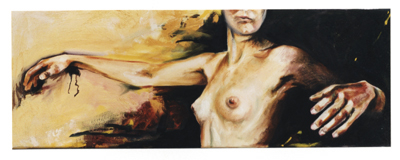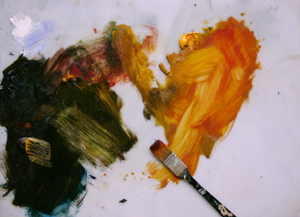ę November 2004 | Main | January 2005 Ľ
December 21, 2004
Pushing paint II
Iím with yesterday's paint and struggling with the bitty hardness in it, the bits that have dried and formed a skin that can be ignored on everything but a cheek - a blemish. But it drags and fights back, unnecessarily in my view.
Pick up the brushes and push some paint about. Then put them down, put them down, fear grips, let go the brushes. Walk away. Walk back. Pick them up again and make tentative marks.
STOP the tentative marks, tentative marks will never work. Take confidence in the years of looking and learning to see and doing and eventually knowing.
Do and go and scrape fresh paint from the tin. And get it on the panel. Go on.
Posted by john at 10:03 AM | Comments (0) | TrackBack
Extraordinary Bubbles
The painting [the action of applying the paint] is an event. An all moving, all singing, all dancing event [without the singing, mostly]. A shoes off, moving through space, listen to the music, feeling the feelings, performance.
Not a sitdownanddothreepicturesbylunchtime job. An intangible, fleeting moment of time and feeling being forced into a container thatís too small and almost, but not quite, entirely unsuitable for it.
Itís the forcing thatís the key, I think; that and the container being too small. Trying to fit something into somewhere it doesnít want to go. [see The Dennis Potter Effect, below]
Itís not a job partly because thereís no job description; and partly because itís impossible. Impossible to put a three dimensional object into two dimensional space. And impossible to get out what Iím feeling at any given time. When Iím painting I feel extraordinary in an ordinary world.
We all of us, mostly, live in the ordinary world Ė and so we should, eating and drinking and shitting and pissing, sleeping and lying in the bath looking down remembering that fist pubic hair that heralded the onset of heartache. In this everyday world itís often hard to get to the painting.
I create a bubble in the ordinary where I can be extraordinary. The bubbles are hard to generate and take some maintaining. Too often the bubble bursts before I can get in and make a difference. I find it a frighteningly fragile thing, the moment the muse settles. Also an arrogant indulgence and waste of time, whydonítyougetyourselfaproperjob?, conceit that I should even consider feeling extraordinary.
So many reasons not to paint.
Posted by john at 09:07 AM | Comments (0) | TrackBack
The Dennis Potter effect
Dennis Potter was a good writer. He had an amazing imagination and a wonderful grasp of the human condition. He also had his own emotional struggle, not underestimating his physical struggle. It was this emotional struggle that fuelled his imagination, that drove his creative spirit.
His television plays in the early days were brilliant and accessible for the main reason that he was being forced to squeeze his emotional struggle into a medium that had restrictions and demands of its own. That and the support of a good producer Ė Kenith Trodd. It is the role of the producer to take the creative flare of a writer and guide it through the complex process of television production, to make it accessible and get a result. [Thanks Angela]
When dear Dennis was left to his own devices, his imagination ran riot and produced an often inaccessible stream of creativity that was lost on the audience.
If what you are trying to do is communicate your feelings, make sure that you use a language that is understandable.
Posted by john at 09:06 AM | Comments (0) | TrackBack
December 20, 2004
what you do
What you do should be what you do.
In many semantic senses,
what you do is what you do,
but often what you do
is what you think you should do,
not perhaps what you do do.
So what I could say is:
what you do should be what you want to do
but what you do
[when doing what you do]
is usually what you want to do.
You donít always want to do what you do
and indeed
you donít always do what you want to do.
But I believe you do your best
when you do what you want to do;
when you do what you do.
Sometimes what you do
isnít what you really do,
sometimes what you do
happens while you're doing
what you're doing;
in these circumstances
you should try and do what you do.
what you do is hard to find
especially if youíre doing something else.
Posted by john at 03:19 PM | Comments (0) | TrackBack
December 16, 2004
paint on paint
Just when you think itís finished, maybe itís time for more paint on the panel.
Painting without question, just looking and, with five big brushes loaded with oil paint from high light to dark shadow, putting down what I think I see.
The light falling on the skin, modelling the form; the myriad undulating shapes that subtly describe the sublime contours of the body. The gentle gradations of tone that indicate the lie of the muscles under the skin. The darker shadows that belie the proximity of bones to the surface.
To capture all this in paint on a flat surface is the ultimate challenge.
Posted by john at 12:34 PM | Comments (0) | TrackBack
December 07, 2004
Not painting
Not painting can be a good thing. During a time spent not painting a huge wave of painterly energy builds up. When eventually time allows the oil paint to come out the wave breaks and the paint comes alive in my hands.
Too long not painting is not good, because, unlike that ability to balance on a tubular steel frame suspended between two circular pneumatic tubes wrapped round metal rims held at an equal distance from a hub by an ingenious array of spokes, it is possible to forget how to paint.
This isnít forgetting how to pick up a brush dib it in some sticky colour and smear the result on a flat surface. Itís forgetting how to forget. The ideal state for painting is to forget all about it and try to achieve a balance where the eye delivers its message directly to the hand without any unnecessary interference from that over-complicated organ: the brain.
Posted by john at 08:31 AM | Comments (0) | TrackBack
December 02, 2004
a time to buy
A picture had been hanging in an excellent restaurant [Gimbals, Sowerby Bridge] for a few weeks and a couple were very interested in buying it. It was a large reclining nude and they, understandably, took their time. When someone else was also interested in buying it they galvanised themselves [all those electrodes and a bath of zinc - quite frightening] into action.
They came round to the studio to make the purchase and while in the studio, and clearly in a buying frenzy [not to mention being galvanised] they saw a picture on the easel that I was still working on. They asked to buy it.

the picture on the easel
Great, another sale. But thereís a problem. I was still working on it. In my mind it wasnít finished. [In my mind, it has to be said, a picture is seldom ďfinishedĒ, what I need is someone to come to the studio on a regular basis and drag the pictures from The Racks and take them away. Leaving a hefty cheque would be a bonus.] So, do I sell the unfinished picture? Do I finish it?
They liked the picture as it was, and they wanted to buy it. Surely that is enough? But it put into question what I was doing. Iím not just making pictures to sell; hell, if I was I wouldnít be painting large than life nudes. Iím trying to express something. If a picture doesnít express what I want, or worse: expresses something I donít want, I have the right to hang on it till it does Ė er... or doesnít, if you see what I mean. Just as I have the right to paint out a picture or part of a picture that I feel doesnít work.
So what did I do? I might hear you ask, were we at a party and not drifting abstractly in cyber-space. I explained that I wasnít completely happy with it as it was, and needed to do a bit more work on it. We discussed what areas I might be working on, and they agreed to let me finish it. It seemed to be the pose and composition they were interested in mainly, not the tonal values which is what I was proposing to alter.
So we were all happy in the end.
Posted by john at 08:44 AM | Comments (0) | TrackBack
December 01, 2004
the paint's out and the artist's upon it

Posted by john at 12:25 PM | Comments (0) | TrackBack
The good the bad and the ugly
Can you just do what you want? Well you can, but you have to accept the consequences. [This is a life thing, I feel, not just an art thing.] And art is very much an Iíll-do-what-I-want-because-I-think-itís-important process these days.
It wasnít always like this, art adhered to rules like any other way of life. It has always dealt with emotions, as have the other branches on the tree: music and writing to name but two. But it wasnít until the nineteenth century that art [painting and sculpture] was raised to an intellectual pursuit. The artist left the high street, took up in the garret, and so began the long struggle of the mind.
There is no reason to paint, no necessity. But man has made marks on his surroundings from the beginnings of time. There seems to be a need to record feelings, to communicate. Dogs piss on lampposts to communicate; other dogs being able to determine the mood, health and status from the smell.
The exchange of information seems a fundamental requirement, after being kept warm and dry, fed and caressed occasionally. But should we communicate everything and anything? Is it open season? The Good the Bad and the Ugly?
Why not? We just have to accept the consequences.
Posted by john at 11:05 AM | Comments (0) | TrackBack